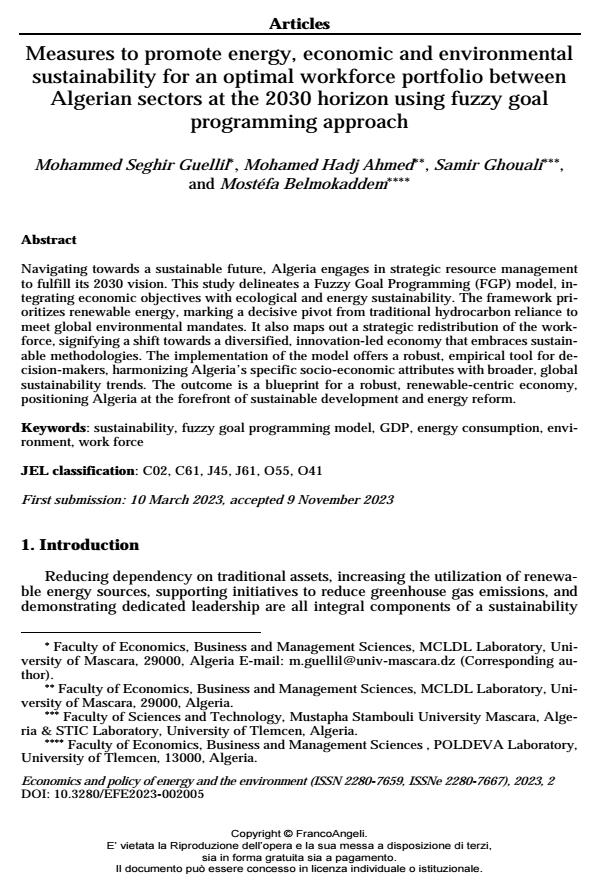Measures to promote energy, economic and environmental sustainability for an optimal workforce portfolio between Algerian sectors at the 2030 horizon using fuzzy goal programming approach
Journal title ECONOMICS AND POLICY OF ENERGY AND THE ENVIRONMENT
Author/s Mohammed Seghir Guellil, Mohamed Hadj Ahmed, Samir Ghouali, Mostéfa Belmokaddem
Publishing Year 2023 Issue 2023/2
Language English Pages 19 P. 103-121 File size 261 KB
DOI 10.3280/EFE2023-002005
DOI is like a bar code for intellectual property: to have more infomation
click here
Below, you can see the article first page
If you want to buy this article in PDF format, you can do it, following the instructions to buy download credits

FrancoAngeli is member of Publishers International Linking Association, Inc (PILA), a not-for-profit association which run the CrossRef service enabling links to and from online scholarly content.
Navigating towards a sustainable future, Algeria engages in strategic resource management to fulfill its 2030 vision. This study delineates a Fuzzy Goal Programming (FGP) model, inte-grating economic objectives with ecological and energy sustainability. The framework priori-tizes renewable energy, marking a decisive pivot from traditional hydrocarbon reliance to meet global environmental mandates. It also maps out a strategic redistribution of the workforce, signifying a shift towards a diversified, innovation-led economy that embraces sustainable methodologies. The implementation of the model offers a robust, empirical tool for decision-makers, harmonizing Algeria’s specific socio-economic attributes with broader, global sus-tainability trends. The outcome is a blueprint for a robust, renewable-centric economy, posi-tioning Algeria at the forefront of sustainable development and energy reform.
Keywords: sustainability, fuzzy goal programming model, GDP, energy consumption, environment, work force
Jel codes: C02, C61, J45, J61, O55, O41
- Finding a mix of renewable energy for different stakeholders by applying multi‐criteria decision‐making techniques Amelia Bilbao‐Terol, Verónica Cañal‐Fernández, Carmen González‐Pérez, in International Transactions in Operational Research /2026 pp.2499
DOI: 10.1111/itor.70002
Mohammed Seghir Guellil, Mohamed Hadj Ahmed, Samir Ghouali, Mostéfa Belmokaddem, Measures to promote energy, economic and environmental sustainability for an optimal workforce portfolio between Algerian sectors at the 2030 horizon using fuzzy goal programming approach in "ECONOMICS AND POLICY OF ENERGY AND THE ENVIRONMENT" 2/2023, pp 103-121, DOI: 10.3280/EFE2023-002005